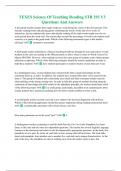TEXES Science Of Teaching Reading STR 293 V3
Questions And Answers
A first-grade teacher teaches three sight words per week during the course of the fall semester. This
includes reading books and playing games containing the words. At the end of six weeks of
instruction, she has students take turns individually reading all the sight words taught over the six
week period from the word wall. The teacher then records the percentage of words each student reads
correctly as a grade in the grade book. Which of the following assessment types is this teacher
utilizing? ANS summative assessment
A third-grade teacher administers a fluency benchmark halfway through the year and notices several
students in the class are reading in the 80th percentile or above when it comes to Words Correct Per
Minute (WCPM). However, when reading out loud, this same group of students reads without proper
inflection or phrasing. Which of the following strategies should the teacher implement in order to
help these students? ANS have students participate in reader's theatre several times per week
In a kindergarten class, several students have mastered the letter-sound relationships for the
consonant letters g, d, and b. In addition, the students have mastered the short vowel sound for the
letter o. This group of students also consistently uses initial and final consonant sounds correctly
when spelling words during writing time. In order to help this group of students develop along the
continuum of knowledge and skills related to the alphabetic principle, the teacher should take which
of the following steps? ANS In a small group, read simple, decodable texts containing the letter
sounds students have mastered, modeling how the letter sounds combine to form words.
A second-grade teacher recently received a new student who has been diagnosed with dyslexia.
Which of the following approaches should the teacher implement during reading instructional time?
ANS a multimodal curriculum with various literacy activities
How many phonemes are in the word "spit"? ANS 4
A kindergarten teacher is planning to read the book Pete the Cat: Five Little Pumpkins, by James
Dean, to the class and ask some text-dependent questions. The teacher has several English Language
Learners in the classroom and wants to ask developmentally appropriate questions. In the book, five
pumpkins sit on a gate, fly in the air, and trick or treat, among other fall activities. The book talks
about each pumpkin, from number one to number five, and each one's unique characteristics. At the
end of the story, the pumpkins are shown walking away from the reader, ready to have fun.
, The teacher turns to the page in the book where the pumpkins are flying and says, "What are the
pumpkins doing?" When calling on students, the teacher should expect a student with a beginning
level of oral language proficiency to respond by: ANS pointing to the flying pumpkin in the book
while the teacher holds it open.
A kindergarten teacher is planning to read the book Pete the Cat: Five Little Pumpkins, by James
Dean, to the class and ask some text-dependent questions. The teacher has several English Language
Learners in the classroom and wants to ask developmentally appropriate questions. In the book, five
pumpkins sit on a gate, fly in the air, and trick or treat, among other fall activities. The book talks
about each pumpkin, from number one to number five, and each one's unique characteristics. At the
end of the story, the pumpkins are shown walking away from the reader, ready to have fun.
On one page of the text, the pumpkins are scared because the wind has blown out the candles. The
picture in the book shows just the pumpkins' scared eyes and the lights out all around them. The
teacher says, "All we can see are the pumpkins' eyes. How do you think they are feeling right now?"
A student answers, "Sad. It dark." This response ANS Intermediate
A third-grade class contains students at various levels of English language proficiency. Some have
been learning English for less than a year. This week, the teacher has been conducting read alouds
featuring biographies as part of a unit on book genres. So far, the teacher has read from the following
biographies: Abraham Lincoln, Martin Luther King, and Harriet Tubman. However, next week, the
teacher plans to incorporate excerpts from biographies on Caesar Chavez and Frida Kahlo. Then, the
students will pick another person of interest, conduct research, and complete the organizer below:
After the organizers are complete, the teacher tells students to take the information they have learned
and form a paragraph summarizing the most important aspects of their research. At a later date,
students will revise and edit their paragraphs with a peer and then read them aloud individually to the
class.
The teacher notices some ANS provide the students with sentence stems to guide their writing
A third-grade class contains students at various levels of English language proficiency. Some have
been learning English for less than a year. This week, the teacher has been conducting read alouds
featuring biographies as part of a unit on book genres. So far, the teacher has read from the following
biographies: Abraham Lincoln, Martin Luther King, and Harriet Tubman. However, next week, the
teacher plans to incorporate excerpts from biographies on Caesar Chavez and Frida Kahlo. Then, the
students will pick another person of interest, conduct research, and complete the organizer below:
After the organizers are complete, the teacher tells students to take the information they have learned
and form a paragraph summarizing the most important aspects of their research. At a later date,




